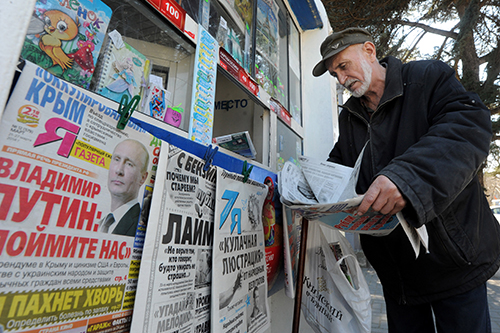“You should move to Kiev,” I was trying to persuade a friend of mine to leave Crimea.
I first met him at the time when cassettes were used in voice recorders, there were no e-mail addresses on business cards, and people preferred to make acquaintances in bars, not online. He asked me not to make his name public, but all you need to know about him is that he is 30, lives in Crimea, and is an objective journalist. Lately, there has been a shortage of objectivity in the Crimean media.
“I can’t! Who will write about the developments in Crimea if everyone leaves?” he said.
“Look at the upside,” I said. “In Kiev you will be able to order an Americano.”
It’s a local joke. Not long before our conversation took place the owners of a couple of Crimean cafés renamed Americano coffee “Russiano” on their menus. It is a peculiar form of Crimean patriotism.
I left Crimea in 2010 but still report on it from Kiev. In the past year, more than half the Crimean journalists I know left the peninsula, which was illegally annexed by Russia. About 25 moved to Kiev. This patriotism with a Cold War tinge was one of the reasons. Those who left have told me that if you take photos a “patriot” will often crop up to ask whether you have the authority to photograph, or will call the police to try to have you arrested for spying. It seems as if there are more patriots of Russia than Russian policemen in Crimea. It is hard to evade their watchful eye.
And frequent contact with the police may attract the attention of the FSB, the Russian security service. For a journalist, this brings the risk of going through the mill of the Russian penal system.
No, they don’t shoot at journalists in Crimea. Journalists do not disappear. But to work there you need courage.
Journalists there risk being imprisoned. Eskender Nebiyev, a cameraman for Crimean TV channel ATR, was arrested on April 21 and charged with participating in a rally that took place in Simferopol, the capital of Crimea, before it was annexed. Lenur Islyamov, the owner of ATR, said in reports after the arrest that Nebiyev had been covering the rally as a journalist. He was released on bail two months later, after the Mufti of Crimea Emirali Ablaev vouched for him, news reports said. Nebiyev is still facing charges, according to reports. [Editor’s note: CPJ is still investigating this case.]
Relatives of journalists are also coming under pressure. That’s how FSB agents decided to converse with Anna Andriyevskaya, a Crimean journalist living in exile in Kiev. According to reports, agents searched her parents’ apartment on March 13 and told them a criminal case had been filed against their daughter over an article she wrote.
In Crimea, a journalist might be interrogated for hours, searched, or simply beaten up. Sergei Mokrushin and Vladlen Melnikov, from the Center for Investigative Journalism, were detained by members of what is known as the Crimean “self-defense force,” according to reports. They were taken to headquarters of the self-defense group, beaten, and interrogated with a member of the local parliament present, according to reports citing the journalists’ account. Freelancer Osman Pashaev was also beaten by members of the self-defense force, who took his film equipment, according to reports. Natalia Kokorina, from the Center of Investigative Journalism, was summoned for a FSB interrogation that lasted for hours, according to reports.
Accreditation, broadcast licenses denied
But most often, authorities simply make it impossible for journalists to work. Press friends still in Crimea told me that authorities don’t give accreditation for events where it is needed. They refuse to give comments or answer official inquiries. They do not let journalists take pictures at public events. They refuse to license broadcasters such as the Crimean Tatar channel ATR.
Potential informants and sources know that they might get fired for giving an interview, because the “wrong journalist” can discredit local authorities. Journalists I know, who are still in Crimea, say officials have repeatedly refused to give comment for fear of losing their jobs.
When Crimea was annexed, reporters who remained in the region were left with two choices: working for a pro-government outlet and practicing self-censorship, or becoming a propagandist who spins elaborate lies. With many independent media outlets forced to close, and officials seldom providing comment to independent journalists, the main source of news in Crimea is Kryminform, a news agency controlled by Sergei Aksenov, the leader of the Crimean authorities. As a result, I have watched as coverage of the region has become one-sided, objective analysis has been replaced with emotionally charged articles, and propaganda has started to dominate. In my experience, it is rare to see a news outlet based in the region report negatively about Russia.
For those journalists who chose the third option–to stay true to their profession–they continue to work, but under pseudonyms. They have removed slogans from their microphones. They do not ask questions at press conferences. They seldom do investigative journalism. They try to ask only a limited number of people for comments. They go to remote places to film. At public events they try to keep out of sight from former colleagues for fear that someone might notify the police about “undesirable” journalists.
But little by little they are becoming bloggers and observers. Or they crack and retire.
My objective Crimean friend called me again a few months ago.
“You know, I want to move to Kiev for two months. Just to give it a try. For two months only,” he said as if he was trying to convince himself about how long he would stay.
But who will write about the developments in Crimea if everyone leaves?
